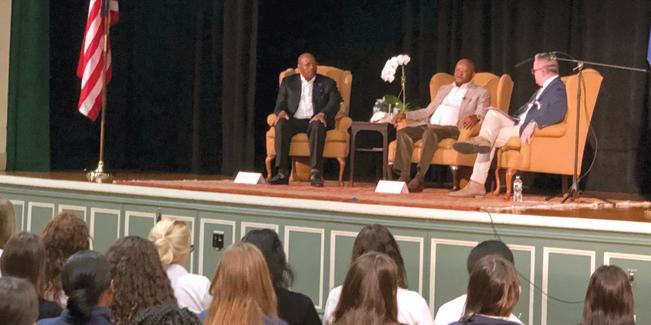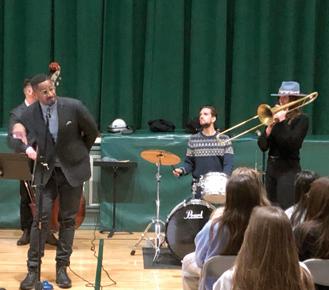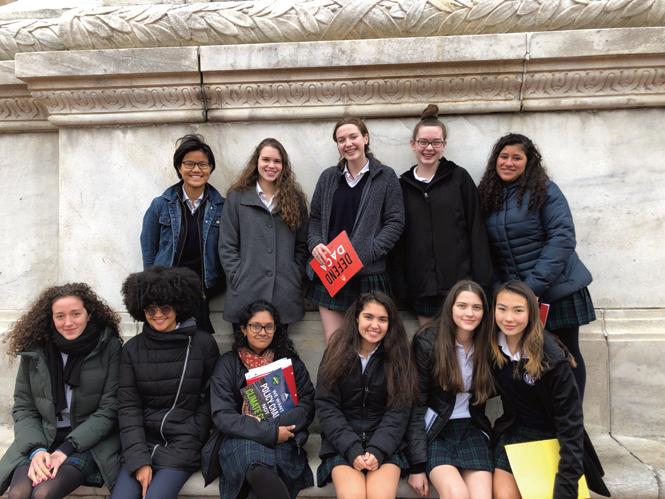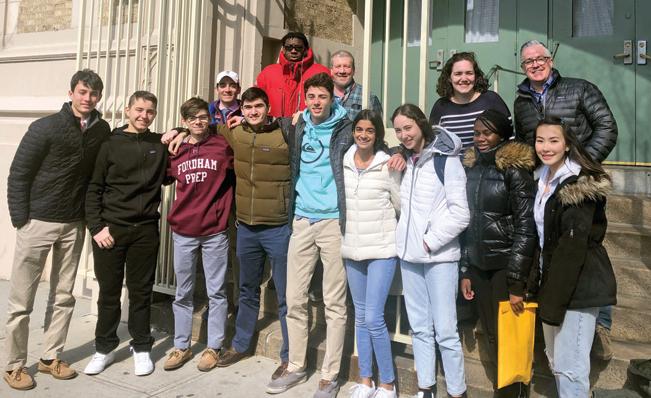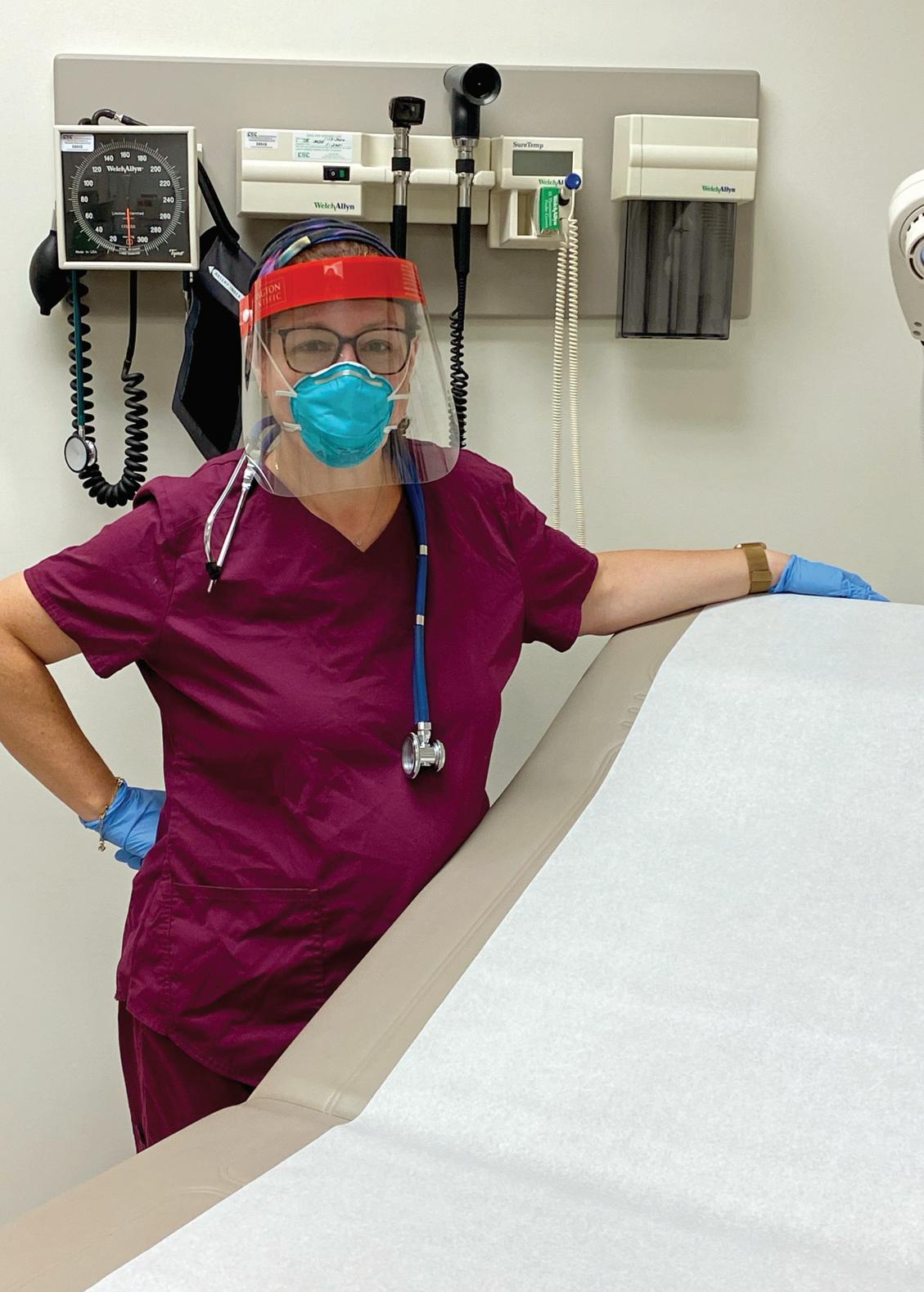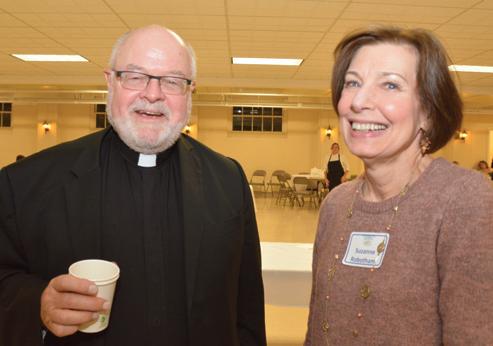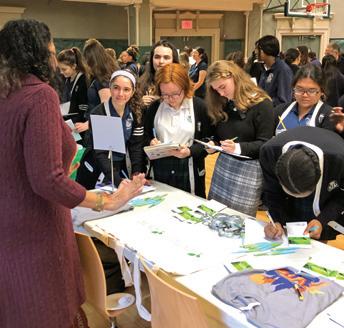
9 minute read
Awareness and Action





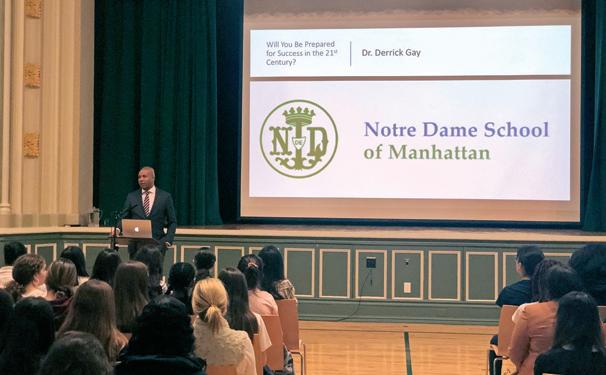

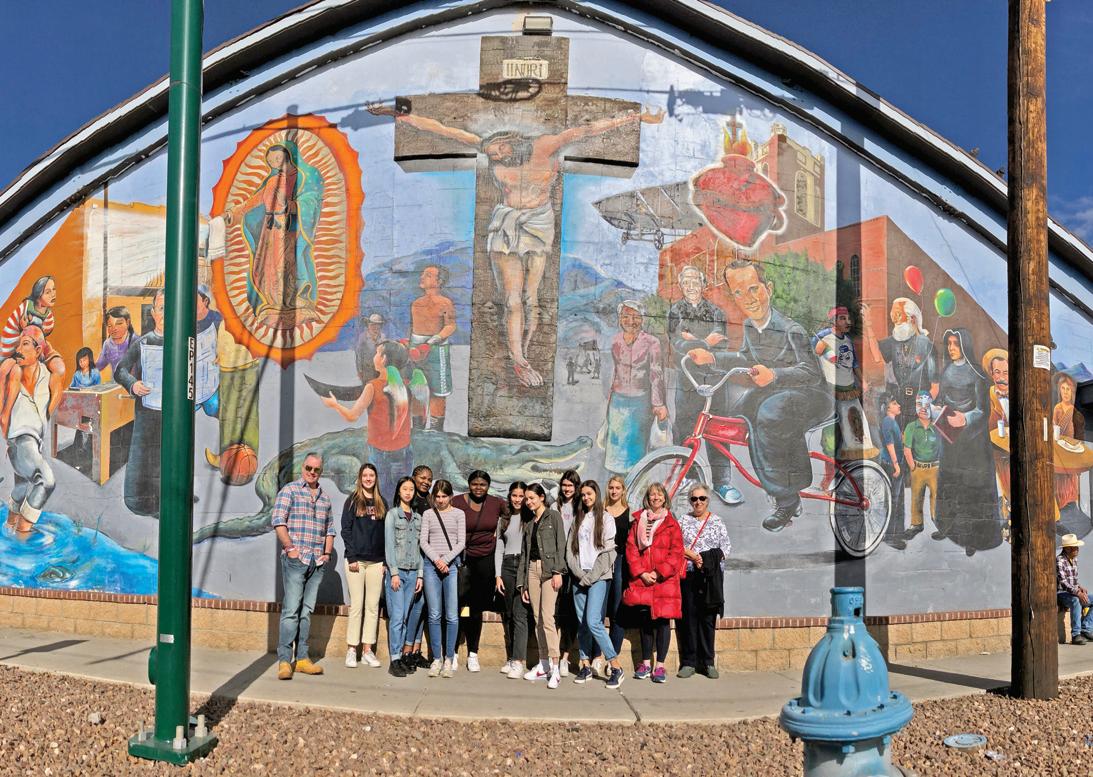
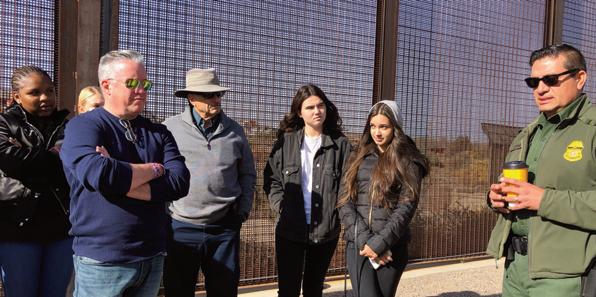
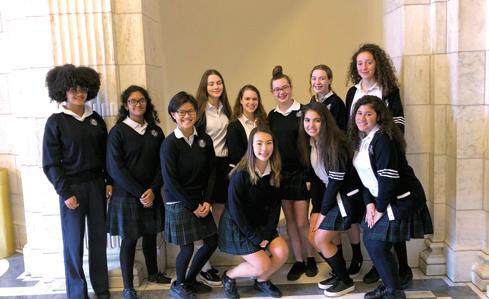
Anne de Xainctonge founded Notre Dame with a spirituality based of that of St. Ignatius Loyola, whose mission was putting faith into action. To this day, students Chez Nous take this to heart in all that they do. This is especially evident in the social justice activities of the school community. ND offers a great deal on campus to educate students on the injustices of the world, and to help them find practical ways to make a difference. On campus, the school offers opportunities to widen their scope on social justice issues in the classroom as well as in extracurricular endeavors. Mr. Scott Vasey’s Global Inequalities class focuses on issues for women who are oppressed in various countries. Through lectures, readings, and discussions, the students are able to understand the roots of these injustices and ways to stop them. Girls enrolled in this course have stated that it had a profound impact in their understanding of women’s issues on a global scale. Another vehicle for social awareness can be found in the school’s organization called S.T.A.N.D. (Solidarity Throughout All of Notre Dame). Meeting regularly and creating outreach projects, this club deals with social justice issues including global warming, immigration, gun control, and race relations.
It is not just on campus that they are seeking ways to effect change. Notre Dame has also offered outreach programs that have taken students to other locations to understand global issues. Yearly, the school attends the Ignatian Family Teach-In for Justice in Washington, D.C. This is a forum for teenagers that addresses timely social justice issues in the context of Catholic faith tradition. In 2019, the primary focus was on racism and immigration. Fifteen Notre Dame students ventured to Washington, D.C., where they listened to amazing speakers, and worked in small breakout groups with young adults from around the country. The ultimate goal was to return to campus with practical ways to make a difference. And they did just that.
This year’s Teach-In took place in October. It was unfortunately presented virtually, but the spirit and dedication were the same. The students participated in online lectures as well as the breakout sessions. The theme was Prophetic Resilience, a call to build up individual and collective capacities for healing and justice. Students listened to relevant stories, and learned strategies on how to rise up for the common good; and to tap into the energy of the Spirit at work in themselves and in others.
Another impactful opportunity that brought students to the frontlines of social inequities was the ND trip to El Paso, Texas last December.
Sr. Mary Dolan, SU, had researched various opportunities for students to be exposed to immigration issues. She discovered The Encuentro Project, a collaborative and intercongregational ministry involving the Jesuits of the USA Central and Southern Province. Through an intense immersion, its goal is to Notre Dame is committed help participants gain a to continuing to find ways greater understanding of the reality of migration in to strengthen the sense of the El Paso-Ciudad Juarez community and acceptanceborder community, and inspire participants to of all students, a mission challenge the borders in that has been a hallmark their own communities that push immigrants to Chez Nous for generations. the margins.
Ten ND girls ventured to El Paso with four faculty last December, and participated in the Encuentro Project. They visited the border wall; volunteered in a migrant shelter; and had sessions with lawyers and advocates on ways to effect change for this vulnerable people. They came back inspired to continue to fight for immigration rights even right here in New York City. Intended to be an annual trip, this year’s will take place in December but due to the pandemic, it will be remote. There will still be opportunities for conversations, learning, and brainstorming with experts and advocates in this regard. Sr. Mary reported that there was a record number of students interested in joining this year.
The awareness of social disparities is not just a global focus however. Since 50% of Notre Dame’s students are students of color, the school has recognized the need for greater awareness and acceptance of all people. The school has changed its traditional American Studies course to include two new classes on African American History and Native American History. ND also schedules speakers and assemblies to deepen students’ understanding of diversity. Notre Dame was honored to host two prominent South African executives and civil rights activists.Mr. Scott Vasey’s Global Mr. Sakumzi Macozoma Inequalities class focuses and Mr. Bulelani Thandabantu Ngcuka wereon issues for women who invited to campus to are suppressed in various speak to the students last October. Both were countries. Through lectures, friends with Nelson readings, and discussions, Mandela and all three were pivotal members the students are able to of the African National understand the roots of Congress. They worked tirelessly together to endthese injustices and ways apartheid. These powerful to stop them. activists told their story of fighting apartheid and inspired the girls to make a difference in their own communities. Dr. Derrick Gay, an expert in inclusion and diversity strategies, presented an all-school seminar last November. And throughout the year, through the support of the Gilder Lehrman Institute of American History, the Lincoln Center Jazz Ensemble performed and educated the students on the strong influence African Americans had on culture and music in this country. Last December Music Director Ms. Nicole Wakabayashi created “What is Black?” a student production of songs, poetry, music and art celebrating Black culture.
During this past spring, the Black Lives Matter movement that was reignited with the death of George Floyd, brought to light that not enough was being done for systemic change in our society, including at Notre Dame. With this in mind, Dr. Virginia O’Brien, SU, President of Notre Dame, spent a great deal of time working with other administrators of the school over the summer to create ways to address this issue so that all members Chez Nous would have a greater awareness of racial insensitivities and injustices. The school continues to schedule assemblies and meetings covering equity and social justice issues. The theme of the school year is Community, and thus the focus has been on ways to make all members of the community feel safe and accepted. In addition to these structured opportunities for students, Notre Dame has begun working with two consultants, Dr. Sandra Chapman, and Ms. Martha Haakmat.
Dr. Chapman is the founder of Chap Equity, an organization rooted in the belief that, through teamwork, institutions can discuss and discover the foundational research needed to address the needs in a community; create conversations that support individuals where they are and confront barrier issues; and create actionable steps towards building stronger educational communities. ND hired her to help the school identify the racial equity issues that the community is facing. Since the start of the school year, she has conducted workshops, seminars, and one-on-one sessions to help guide individual and institutional change. She began the school year with a workshop for faculty on microaggressions, helping them become more cognizant of any potential verbal or behavioral indignities that they may display, even unintentionally. The teachers state that they found it helpful and enlightening and are grateful for the oppor-
Social Justice Opportunities at Notre Dame
On Campus
•Global Inequalities Course • African American History Course • Native American Course • S.T.A.N.D. Social Justice Club (Solidarity
Throughout All of Notre Dame) • Jazz Concerts/Classes—Gilder Lehrman
Institute of American History •“What is Black?” Concert—ND’s showcase of Black American History, Music, and Art
Off Campus
•Ignatian Family Teach-In for Justice- Washington DC • ND Encuentro Service
Trip—El Paso, Texas
Consultants and Speakers
•Dr. Derrick Gay: Diversity Workshop • Dr. Sandra Chapman: Chap Equity—
Racial Equity Seminars • Ms. Martha Haakmat: Haakmat
Consulting—DEI (Diversity, Equity, and Inclusion) Programs • Mr. Sakumzi Makozoma and
Mr. Bulelani Thandabantu Ngcuka:
Apartheid Civil Rights Activists
tunity to learn. She also held a formal seminar about implicit bias, a term used when individuals have preconceived attitudes towards people, or associate stereotypes with them without their conscious knowledge. In addition to facilitating this workshop for teachers, she also held one for parents as well. Again, they were vibrant and productive sessions. In the course of the work she is doing with ND, she will also address racial anxiety and pressures of being students of color.
Ms. Martha Haakmat is the other consultant advising the school regarding diversity awareness and resolution. She is the Executive Director at Haakmat Consulting in Brooklyn. She is an experienced educator who has spent her 32-year career teaching and leading in independent schools. Her mission is to help schools develop strategic planning expertise, focusing on diversity, equity and inclusion (DEI) goal setting and ongoing systemic work. Her focus this fall has been to work with the Board of Trustees and the school administrators to provide leadership coaching and support, as well as offer insights to help the school with DEI strategic planning. Ms. Haakmat expressed her goal clearly, “My vision is a world where schools and organizations are built upon and operating from strong foundations for equity and justice, and where the people in them are inspired to be their best selves.” The school shares this vision and has appreciated the insights she has given the Chez Nous Board of Trustees.
Notre Dame is committed to continuing to find ways to strengthen the sense of community and acceptance of all students, a mission that has been a hallmark Chez Nous for generations. There is still much work to be done, and ND’s goal is to ensure that all members Chez Nous feel they are treated fairly and celebrated for who they are.
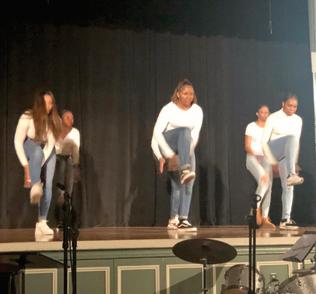
From Top to Bottom: ND Participants in the Ignatian Teach-In Summit on Immigration and Racism; Students perform in “What is Black?”; Lincoln Center Jazz Ensemble performs at ND; Students from Notre Dame and Fordham Prep ready for the Ignatian Teach-In in Washington, DC; Mr. Macozoma and Mr. Thandabantu Ngcuka discussing apartheid with the ND community
